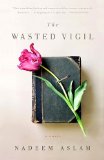Reading Guide Questions

Please be aware that this discussion guide will contain spoilers!
About This Guide
The introduction, questions, and suggestions for
further reading that follow are designed to enliven your group's discussion of
Nadeem Aslam's novel,
The Wasted Vigil.
Reader's Guide
- Nadeem Aslam has been widely praised for his richly poetic prose style.
What passages in the book seem especially beautifully written? What makes
these passages so powerful?
- Early in the novel, readers learn that Marcus has lost his hand. Why
does Aslam withhold the story of precisely how he lost that hand
until much later in the book?
- When David confronts James about torturing Casa, telling him that it's
illegal, James replies: “Illegal? This is war, David. You've been looking
into the wrong law books. These are battlefield decisions” [p. 305]. How
else does James justify torture? Why is David so fiercely opposed to it? How
do their arguments relate to the current controversy about the United
States' use of torture in the “war on terror”?
- James says of Casa and fundamentalists like him: “They are children of
the devil. They have no choice but to spread destruction in the world.”
David counters: “He is the child of a human, which means he has a choice and
he can change” [p. 306]. Discuss these differing points of view.
- How does The Wasted Vigil deepen our understanding of both the
Soviet and American conflicts in Afghanistan? What does the novel suggest
about the motives and methods of American and Soviet involvement in the
region?
- How is the Taliban depicted in the novel? Why are they so violently
repressive of women and so fiercely opposed to education?
- What aspects of his personal and family history draw Casa to become a
jihadi? How does Aslam manage to make him a sympathetic a character?
- What does The Wasted Vigil say about how war damages human
relationships—between parents and children, wives and husbands, lovers and
friends?
- What does Marcus mean when he thinks of himself: “He is alive but has
been buried in many graves”? [p. 317].
- Why is the overturned giant stone head of the Buddha that rests in what
was once Marcus's perfume factory given such a prominent place in the novel?
What is the symbolic value of this statute?
- The narrator writes: “This is among the few things that can be said
about love with any confidence. It is small enough to be contained within
the heart but, pulled thin, it would drape the entire world” [p. 307]. In
what ways is The Wasted Vigil as much about love as it is about
violence, hatred, and war?
- What is it that brings Lara, David, Marcus, Casa, and James to Marcus's
house? In what ways is the house itself symbolic?
- What are some of the most tense and shocking moments in the book? Why
does Aslam include such graphic depictions of violence in the novel? What
effects do these depictions have on the reader?
- Near the end of the novel, Marcus reflects: “Both sides in Homer's war,
when they arrive to collect their dead from the battlefield, weep freely in
complete sight of each other. Sick at heart. This is what Marcus wants, the
tears of one side fully visible to the other” [p. 314]. Why does Marcus want
this? What good might come of each side witnessing the grief of the other?
Suggested Reading
Feryal Ali Gauhar, No Space for Further Burials;
Karmi Ghada, In Search of Fatima: A Palestinian Story;
Philip Hensher, The Mulberry Empire;
Yasmina Khadra, The Swallows of Kabul;
Khaled Hosseini, A Thousand Splendid Suns;
Francesca Marciano, The End of Manners;
James Meek, We Are Now Beginning Our Descent;
Rory Stewart, The Places in Between.
Unless otherwise stated, this discussion guide is reprinted with the permission of Vintage.
Any page references refer to a USA edition of the book, usually the trade paperback version, and may vary in other editions.

 Book Reviewed by:
Book Reviewed by:



